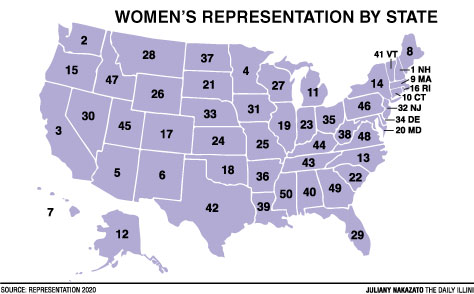Illinois ranks 19th in gender parity

Dec 9, 2015
Last updated on May 5, 2016 at 06:22 p.m.
Illinois was ranked as just above average for equal representation of women in office, according to a report by Representation 2020, a FairVote program that works to increase the representation of women in elected officesbr.
According to the report’s ranking, a state reaches gender parity when they receive a score of 50 out of 100, meaning there are equal numbers of men and women in elected offices. A score of zero means there are no women present in elected officebr.
Illinois received a score of 19.7 out of 50, and was ranked 19th out of all 50 states in the country. Illinois’ ranking dropped since 1993, when it was ranked 17th out of 50br.
Get The Daily Illini in your inbox!
New Hampshire was the state in the country to achieve gender parity with a score of 57.
The State of Women’s Representation 2015-2016 report for the state of Illinois looked at the number of women elected to office in four categories and assigned points to each category – U.S. Congress, statewide executive office and state legislative office are worth 30 points, and local representation at the city and county level is worth 10 points.
“We have different points for different offices in the state in order to weight the importance of federal offices and state executive offices more highly than the local offices because the impact of that representation, we feel, is greater,” said Cynthia Terrellbr, chair of Representation 2020.
However, Terrell said that this trend of underrepresentation is evident throughout the entire country.
“In fact, the United States ranks behind 95 other countries in the percent of women’s representation on our national legislature,” she said. “In the case of women’s representation at the state legislative level, the number actually regressed [nationally] – that’s pretty staggering.”
Within the Office of the Provost, the Gender Equity Council, similarly works to increase the representation of women on campus.
“There are people who are committed to this, but there is still a lot of work that can be done,” said Nadya Masonbr, professor in physics and member of the Gender Equity Council.
“At the University, it’s especially important because we have a lot of two-body faculty,” said Peter Sauerbr, professor in electrical and computer engineering and member of the Gender Equity Council. “Each of them is trying to be productive, but both of them are not necessarily treated the same, and not able to do the same things.”
Terrell said that with the gender parity report, Representation 2020 is advocating for changes through political institutions to remedy structural barriers, such as recruitment practices, voting systems and internal legislative measures. She said that this problem is very similar to the adversity women faced with getting equal rights to education.
In regards to Illinois’ ranking of 19 out of 50 on the report, Mason said, “We should try to be a leader, being average isn’t good enough.”





